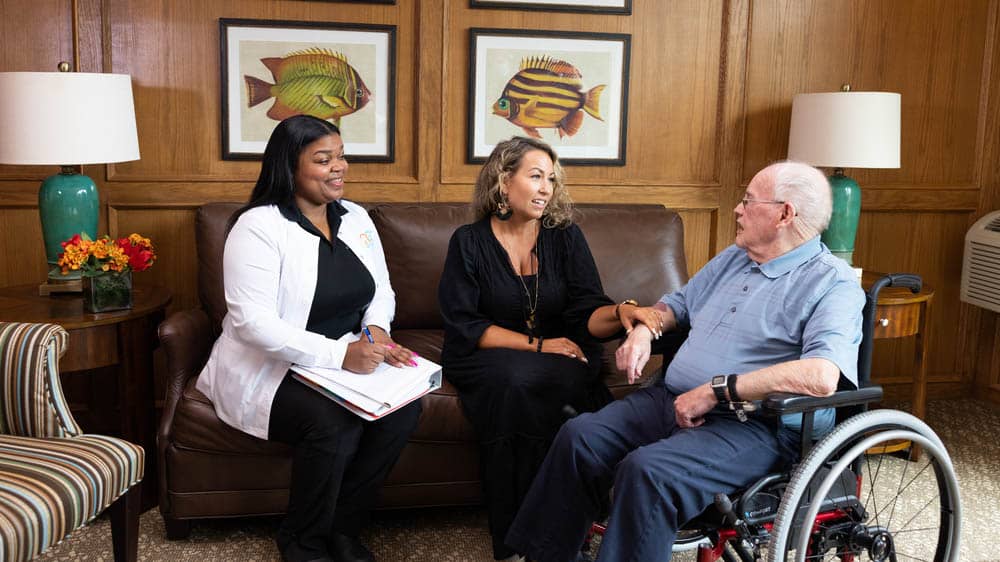

Working From Home While Caring for a Senior Adult
Sarah sits in her home office, trying to focus on a report due to her boss that afternoon. Her attention is pulled away from her looming deadline each time she hears her father, George, sigh or shuffle in the next room. Over the past year, the health of Sarah’s 70-year-old father has declined, requiring more and more of her attention.
Balancing work with being a primary family caregiver for an aging adult or an adult with a disability can be challenging, especially when working from home. For many, like Sarah, juggling both responsibilities can be overwhelming, often leading to burnout. However, with proper planning and effective coping strategies, it is possible to balance both work and caregiving responsibilities. Check out these tips and strategies to help you master the art of balancing both roles with ease.
Adapt the Environment To Be Accessible and Safe
Assessing a senior adult’s needs is the first step in creating a home environment where they can be somewhat independent, giving you more uninterrupted time to focus on your job duties. Does Mom have balance issues, making her less likely to cross the room for the TV remote or a glass of water? Is her arthritis preventing her from opening the orange juice lid or spaghetti jar on her own? Is her hearing making it difficult to understand what others are saying over the phone? Does she keep forgetting to take her medication on time? Here’s a list of items that can help Mom maintain her independence and limit the instances that take you away from completing work tasks:
- Mobility aids: Canes, walkers, and rollators—a walker with wheels and a built-in seat for resting—provide confidence in moving around.
- Reachers and grabbers: These tools can help pick up objects without bending or stretching.
- Visual and hearing aids: Amplified phones, electronic magnifiers, and large-print books can assist with sensory impairments.
- Home monitoring systems: Fall detection equipment and cameras can check safety and well-being, and wearable devices can summon help when needed.
- Smart plugs and switches: Phone apps can remotely control lights, fans, and other devices when they are plugged into a smart plug or switch.
- Medication systems: A medication reminder and dispenser with a loud alarm and blinking red LED light can remind when medication should be taken.
- Adaptive clothing: Instead of zippers and difficult buttons, adaptive clothing has easy closures such as Velcro and magnetic buttons.
- Jar grippers: Rubber jar grippers and electric jar openers help those with limited dexterity or strength.
Establish a Regular Routine
Being a productive employee and an attentive caregiver while working from home probably seems like an unattainable goal, but it doesn’t need to be. It is possible to maintain a productive, healthy balance by establishing a routine with specific times for work and for caregiving activities. If Dad knows when you will be taking a break from work to have a cup of coffee and talk about the morning news or go for a short walk, he will be less likely to ask for your help until your designated break time. Not surprisingly, having a designated time for hair appointments, social times with friends, and meals gives aging adults a sense of security. Most importantly, a schedule that is the same day after day encourages independence and encourages seniors to do things on their own, such as picking up a hobby, talking with friends, or getting outside in the fresh air, all of which limit the number of interruptions to your workday.
Communicate With Your Employer and Co-Workers
When you work from home, there are many times when you won’t be available to your employer because of your caregiving duties. Communicating your schedule and obligations will prevent misunderstandings and natural animosity within your workplace. By explaining your situation and obligations, your employer will be much more understanding and may be more generous with flexible hours and extended deadlines. Don’t forget about your co-workers as well. There’s nothing worse than your colleagues knowing you are working from home and thinking you aren’t pulling your weight. It’s important to explain your dual responsibilities at home, outline your availability and response times, and communicate your varied working hours so your colleagues know what to expect. Let them know when you will complete a task or get back to them with an answer; that way, there is no confusion.
Take Time for Yourself
Caregiving is a lot of work, and providing care for an elderly adult while working from home can wear you down. To prevent unnecessary stress and burnout, provide effective support, and maintain your level of work productivity, it is essential to take time out for self-care. Here are some helpful tips to consider:
- Exercise regularly: Get at least 30 minutes of exercise each day. It will give you more energy, keep your body strong, and improve your mood.
- Visit your doctor: Don’t put off doctor appointments because you “don’t have time.” Without your good health, you won’t be able to provide the care required.
- Eat a healthy diet: Eat a well-balanced diet of lean meats, whole grains, fruits, and vegetables. This is good for both you and older adults.
- Keep doing what you love: Continue to do the things you enjoy. Take time each week for your hobbies and interests. It’s all too easy to get caught up in the stresses of caregiving, but doing the activities you enjoy will help you maintain your sense of self.
- Reach out for help: It’s essential to occasionally get some relief from your caregiving duties, whether from a family member or an agency caregiver such as one from Right at Home. Just a few hours of temporary respite can make a big difference in the quality of care you can provide.
Working from home while providing full-time care for a senior adult can be daunting, but it doesn’t have to be. You can create a greater sense of calm out of the seeming chaos by taking simple steps. For more advice, tips, and resources, check out just a few of the dozens of organizations dedicated to the support of caregivers:
- National Council on Aging
- Centers for Disease Control and Prevention
- Family Caregiver Alliance
- AARP
- National Alliance for Caregiving
How Right at Home Can Help
Respite care from Right at Home can be a wonderful resource for family caregivers in their quest to stay organized while caring for a loved one. Respite care helps family caregivers recharge. Whether you need a few hours a day or a few days a week, your loved one will be in good hands with a Right at Home professional caregiver, who will follow your loved one’s care plan to the letter while you unwind, allowing you to return to your loved one refreshed to resume your caregiving role. Use our location finder to get in touch with the office nearest you to find out more.
Interested in receiving ongoing tips, advice, and information about the aging journey? Subscribe to our Caring Right at Home e-newsletter today.







